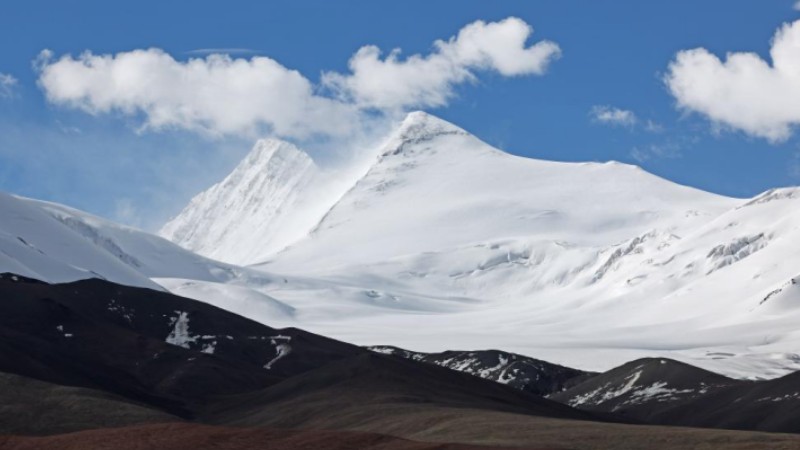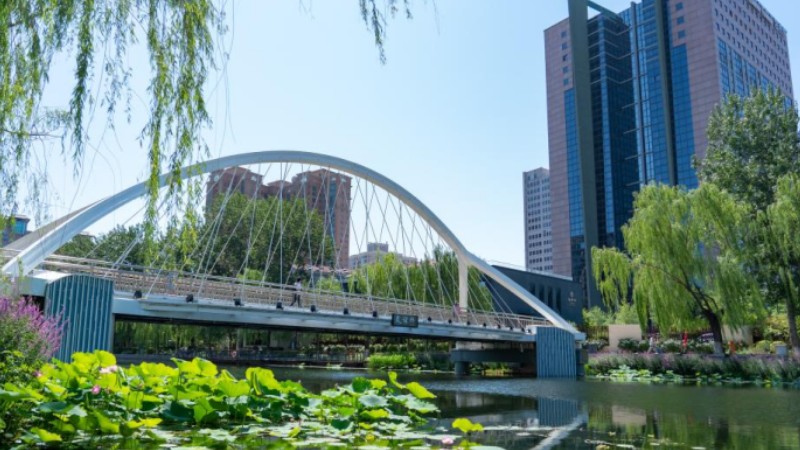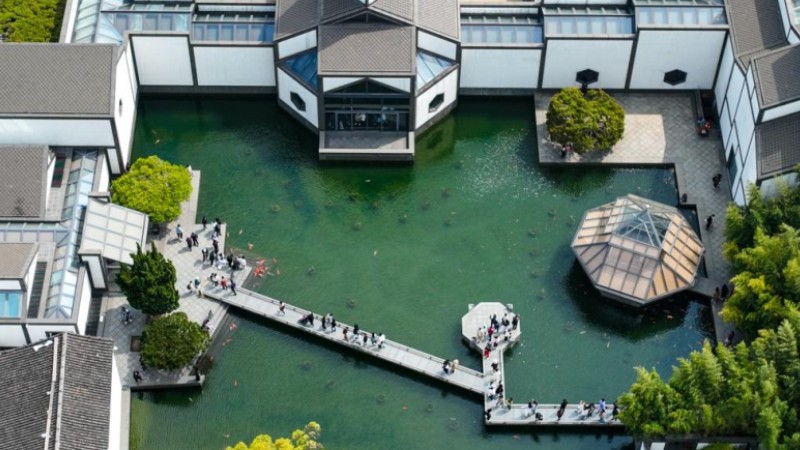The magic of Hunan
A chance encounter with a happy baby and his father at Mao Zedong Square.
The first province we visited in China was Hunan. This was in late March. We had already spent a month roaming the districts of Beijing. It was still too cold for my bones, so I was happy to welcome a different climate, away from Beijing, which I believe has a fake sun; shining with rays but still freezing cold in winter. It was also the first time I had taken a high-speed train. The train effortlessly glided atop buildings from Beijing to Yueyang, and by the time we reached our destination, it was almost nightfall and had started drizzling. Each of us was given an umbrella before strolling to the Yueyang Tower. To this day, here in The Gambia, I have that little umbrella with me. We spent two days in Yueyang, two days in Changsha, and two days in Chenzhou. There, without waiting to visit any other provinces, I concluded that Hunan was the best province in China. I was not wrong. The food, the community, the hospitality, the scenery, the smiles… It was a heart-warming trip that stayed with me for the ensuing three months of my stay in China.
Then, by design or fate, we were informed that we would be returning to Hunan for the China-Africa expo, our last activity before flying back home to our respective African countries. I had already developed a love for Beijing and didn’t know how to process that information. The only province that could make me leave Beijing that late in my stay was Hunan. I could have stayed but I had to experience Hunan again, especially Changsha, which is my favorite city. Hunan was our first visit outside Beijing and it was quite poetic that it was to be our last. For someone crazy about literature and putting together words, I do not miss “the last”, if that makes sense.
This time, it wasn’t a high-speed train, but a plane. Fast, efficient and boring. High-speed train is miles more fun, especially if you have altitude issues. At Changsha, I found it better than I left it: clean, green and serene. The food tasted better and spicier. The people had become even more accommodating. The pride on their faces to see foreign visitors, the authenticity of their smile, the excitement of the kids, the generosity of the elderly people… If Beijing is the brain of China, Hunan is its heart; a heart beating with love.
A group photo in front of the former residence of Chairman Mao
The March trip to Hunan saw us take a different route. We visited some incredible high-tech companies and nature reserves, including Broad Group, where I saw an 11-storey building made within 29 hours, Junshan Island, East Dongting Lake and the eco-friendly fishing village, Liuzhamen. This time, however, in Changsha, Shaoyang, Shaodong and Shaoshan, it was all elevators, hair, luggage, agriculture and Mao Zedong, different aspects of the province, with each holding a special place in its overall development and historical architecture.
Our trips to Hunan had a unique characteristic: high-speed trains. On our first trip, we took it from Beijing to Yueyang and then from Changsha to Chenzhou. It was the same with the June trip. We boarded it to Shaoyang, the largest city by population in Hunan, historically known as Baoqing. There, we visited the Asia Fuji elevator company. Located within the Shaoyang economic zone, Asia Fuji prides itself on its design and production of different elevators. When I say different, I mean DIFFERENT. For the first time in my life, I saw an elevator with four doors, having been introduced to one with three doors earlier at the same company. I had never even seen that on television. It’s top-notch creativity. The elevators can even be personalized in design with color preference at the center.
The next stop was a hair factory. Human hair, to be specific. Shaoyang Sun Group was established nearly two decades ago and has an incredible growth rate. The company has more than 1,000 employees with customers spread across the world, producing 10 million high-end human hair pieces annually. A stroll through the company offered me the chance to see how “human hair” is made, from raw material to packaging. The demand for artificial hair is strong, with women spending thousands of dollars on it. It’s a multi-million-dollar industry! When a woman spends that much on hair, she doesn’t joke around with it. She takes care of it like her life depends on it. Technically, her life does depend on it, as beauty is life. She doesn’t even give it away as gifts. But Hunan is generous, so we were all gifted a package. The visit ended with a beautification exercise. We continued by testing different hairs in wigs and other forms, including ones for men and, for a minute, there was unisex African beauty at Sun Group that had never been experienced before. We also had a stopover in Shaodong at Chunlong luggage and bag company. The focus, dedication and creativity used to make bags enthralled me. Medium and high-grade bags and smart luggage series are at the core of its production line. We later visited the mall and had a thrilling interaction with the locals.
A group of African journalists pose in front of statue of Mao Zedong at the Memorial Hall
After attending the opening ceremony of the China-Africa expo, we headed to Shaoshan, the birthplace of Chairman Mao. It was a refreshing trip. We visited his former residence, the memorial hall and Mao Square, which houses a bronze statue of the late leader. The whole city has the Mao touch; interactive, kind and welcoming. Hundreds of young people filled the Square as we laid wreaths and paid our respects to the great man. You could not only see excitement in the kids, but also feel it. The atmosphere was euphoric. Shaoshan is a Mao city.
A group photo with young people at Mao Zedong Square in Shaoshan
Our last day saw us visit the China-Africa trade demonstration park. We strolled around African stalls, did some freestyle drumming, built networks and had tea with the locals. Hunan Daily was our last stop, where I reconnected with two staff members who had been with us throughout our first trip.
I have written a lot about China in the last four months. I hope it was enough to present a different picture of the country. Someday, maybe soon, I’d love to go to Qufu of Shandong Province, the birthplace of Confucius and channel the Confucian wisdom to write a book befitting of my experience in China.
A group photo with staff of Hunan Daily.
Talibeh Hydara is assistant editor of The Standard Newspaper in The Gambia. He received training in journalism in Beijing as a fellow of the China International Press Communication Center (CIPCC) Programme.
Photos
Related Stories
- Shaoyang, production and export hub for wig products in C China's Hunan
- Changde in C China scales up efforts to develop elderly care service system
- China's Hunan sees robust foreign trade growth in Jan-May
- Youxian tofu: From local delicacy to major industry in China's Hunan
- Hunan culinary delight: Stir-fried pork with chili pepper
- Scenic area in China's Hunan prohibits drone flight for biodiversity
Copyright © 2023 People's Daily Online. All Rights Reserved.









